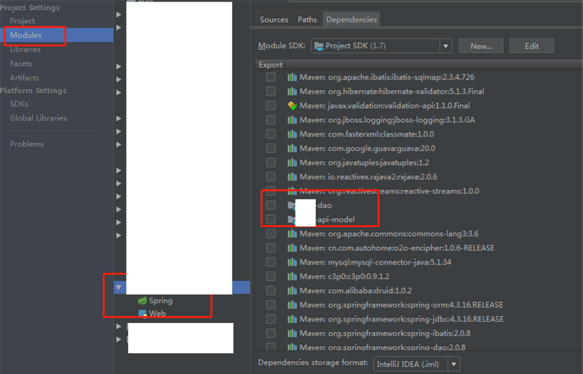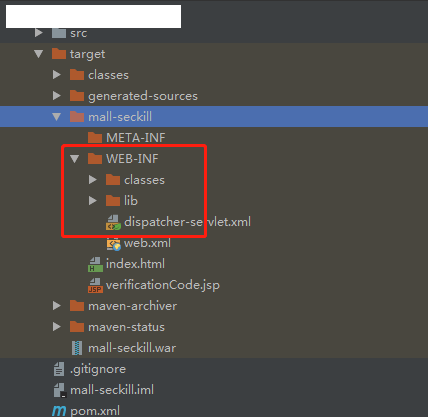IDEA多module项目maven依赖 详解IDEA多module项目maven依赖的一些说明
sandman 人气:1不管eclipse有没有被被时代抛弃,反正是被我抛弃了,因为IDEA是真的好用
现在公司的项目基本都是基于maven的多module项目,controller,service,model,dao等都被分成了不同的module,这样做当然也是为了解耦。
这些module可根据需要在pom.xml配置来打成war包或者jar包
<packaging>jar</packaging>
web主项目设置packaging级别为war,dao、model这些module设置packaging级别为jar。
module之间可以通过module自己的pom.xml来进行相互引用或依赖,如:
<dependency>
<groupId>cn.com.autohome.mall</groupId>
<artifactId>mall-common</artifactId>
</dependency>
<dependency>
<groupId>cn.com.autohome.mall</groupId>
<artifactId>mall-api-model</artifactId>
</dependency>
这样在 File -> project structure 下,选中主web项目

从上面的截图可以看出来依赖的第三方jar和依赖项目子module的区别。
maven在执行install,packaging是jar的会被打成jar放在target目录下,packaging是war的会被打成war放在target目录下。
另外两个target目录会有一点区别,war的target目录会多出来一个和module同名的文件夹,这个文件夹和war解压后完全一致。

所有依赖的jar(包括依赖的module,被打成jar)都会被放lib下
这样在部署的时候,只需要部署相应的war即可。
关于Maven pom.xml中的元素modules、parent、properties以及import
多个module不需要分别执行mvn命令,可以使用聚合(aggregator)来一次构建全部模块
modules
在父pom.xml中通过
<modules> <!-- 模块都写在此处 --> <module>mall-common</module> <module>mall-api-model</module> </modules>
来引用所有需要构建的子模块
parent
继承,和java中的继承相当,作用就是复用
场景
若每个子模块都都用的了spring,那么我们是不是每个子模块都需要单独配置spring依赖了?这么做是可以的,但是我们有更优的做法,那就是继承,用parent来实现。
实现
父(account-aggregator)pom.xml
<modules>
<!-- 模块都写在此处 -->
<module>mall-common</module>
<module>mall-api-model</module>
</modules>
<dependencies> <!-- 配置共有依赖 -->
<!-- spring 依赖 -->
<dependency>
<groupId>org.springframework</groupId>
<artifactId>spring-core</artifactId>
<version>4.0.2.RELEASE</version>
</dependency>
······
<!-- junit 依赖 -->
<dependency>
<groupId>junit</groupId>
<artifactId>junit</artifactId>
<version>4.7</version>
<scope>test</scope>
</dependency>
</dependencies>
子pom.xml
<parent> <groupId>xx.xx.xx</groupId> <artifactId>aggregator</artifactId> <version>1.0.0-SNAPSHOT</version> <relativePath>../pom.xml</relativePath> <!-- 与不配置一样,默认就是寻找上级目录下得pom.xml --> </parent> <dependencies> <!-- 配置自己独有依赖 --> <dependency> <groupId>javax.mail</groupId> <artifactId>mail</artifactId> <version>1.4.3</version> </dependency> <dependency> <groupId>com.icegreen</groupId> <artifactId>greenmail</artifactId> <version>1.4.1</version> <scope>test</scope> </dependency> </dependencies>
依赖管理
继承可以消除重复,那是不是就没有问题了? 答案是存在问题,假设将来需要添加一个新的子模块util,只是提供一些简单的帮助工具,不需要依赖spring、junit,那么继承后就依赖上了,有没有什么办法了?
有,maven已经替我们想到了,那就是dependencyManagement元素,既能让子模块继承到父模块的依赖配置,又能保证子模块依赖使用的灵活性。在dependencyManagement元素下得依赖声明不会引入实际的依赖,不过它能够约束dependencies下的依赖使用。
在父pom.xml中配置dependencyManagement元素
<modules>
<!-- 模块都写在此处 -->
<module>mall-common</module>
<module>mall-api-model</module>
</modules>
<dependencyManagement>
<dependencies> <!-- 配置共有依赖 -->
<!-- spring 依赖 -->
<dependency>
<groupId>org.springframework</groupId>
<artifactId>spring-core</artifactId>
<version>4.0.2.RELEASE</version>
</dependency>
······
</dependencies>
</dependencyManagement>
子pom.xml
<dependencies>
<!-- spring 依赖 -->
<dependency>
<groupId>org.springframework</groupId>
<artifactId>spring-core</artifactId>
</dependency>
<dependency>
<groupId>org.springframework</groupId>
<artifactId>spring-beans</artifactId>
</dependency>
<dependency>
<groupId>org.springframework</groupId>
<artifactId>spring-context</artifactId>
</dependency>
<dependency>
<groupId>org.springframework</groupId>
<artifactId>spring-context-support</artifactId>
</dependency>
<!-- junit 依赖 -->
<dependency>
<groupId>junit</groupId>
<artifactId>junit</artifactId>
</dependency>
<dependency>
<groupId>org.springframework</groupId>
<artifactId>spring-jdbc</artifactId>
<version>4.0.2.RELEASE</version>
</dependency>
<dependency>
<groupId>com.alibaba</groupId>
<artifactId>druid</artifactId>
<version>1.0.16</version>
</dependency>
</dependencies>
使用这种依赖管理机制似乎不能减少太多的POM配置,就少了version(junit还少了个scope),感觉没啥作用呀;其实作用还是挺大的,父POM使用dependencyManagement能够统一项目范围中依赖的版本,当依赖版本在父POM中声明后,子模块在使用依赖的时候就无须声明版本,也就不会发生多个子模块使用版本不一致的情况,帮助降低依赖冲突的几率。如果子模块不声明依赖的使用,即使该依赖在父POM中的dependencyManagement中声明了,也不会产生任何效果。
加载全部内容